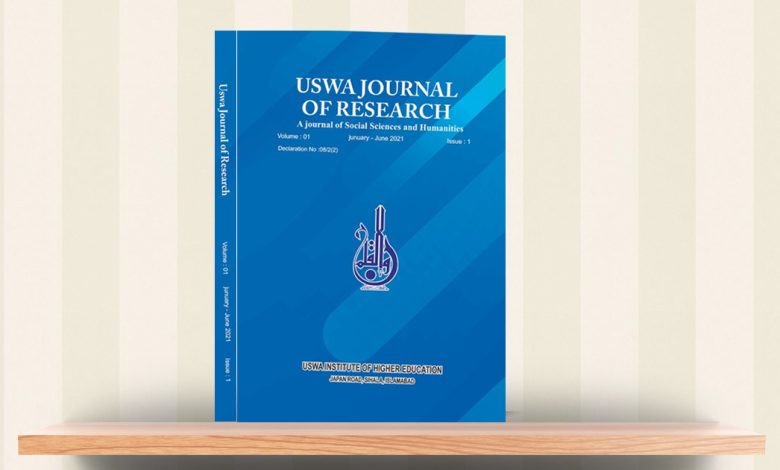Journal Policy

Review & Publication Policy
USWA JOURNAL OF RESEARCH is a peer-reviewed, open-access journal with both print and online versions. UJR encourages high-quality submissions. In order to carry out our non-discrimination principles, we use a double-blind system of peer review. UJR covers the entire spectrum of research, including the following topics:
International Relation, Sociology, Education, economics, History, geography, anthropology, Political Science. Linguistics, Literature, Psychology Social Work, and Islamic Studies,
The journal is published in both print and online versions biannually (June and December).
Peer Review Process
UJR has two stage review system: as soon as a manuscript is submitted, it passes through plagiarism software by the editorial team, followed by editorial review for the quality and suitability of the content of the submitted manuscript. To save time for authors and peer-reviewers, only those papers that seem most likely to meet our editorial criteria are sent for formal review. Those papers judged by the editors to be of insufficient general interest or otherwise inappropriate are rejected promptly without external review
If the manuscript is approved at the editorial review, then it undergoes “PEER REVIEW” process by 2 subject specialists. The suggestions and objections of the reviewers after blinding are communicated to authors, and only when the reviewers are satisfied with the response of the authors, only then the manuscripts are accepted for publication.
We Ask the Reviewers
To provide an assessment of the various aspects of a manuscript, it is asked the reviewer to make a review report on the basis of the following key points:
1. Key results: Please summarize what you consider to be the outstanding features of the work.
2. Validity: Does the manuscript have flaws which should prohibit its publication? If so, please provide details.
3. Originality and significance: If the conclusions are not original, please provide relevant references.
4. Data & methodology: Please comment on the validity of the approach, quality of the data and quality of presentation. Please note that we expect our reviewers to review all data, including any extended data and supplementary information.
5. Appropriate use of statistics and treatment of uncertainties: All error bars should be defined in the corresponding figure legends; please comment if that’s not the case. Please include in your report a specific comment on the appropriateness of any statistical tests, and the accuracy of the description of any error bars and probability values.
6. Conclusions: Do you find that the conclusions and data interpretation are robust, valid and reliable?
7. Suggested improvements: Please list additional experiments or data that could help strengthening the work in a revision.
8. References: Does this manuscript reference previous literature appropriately? If not, what references should be included or excluded?
9. Clarity and context: Is the abstract clear, accessible? Are abstract, introduction and conclusions appropriate?
10. Inflammatory material: Does the manuscript contain any language that is inappropriate or potentially libelous?
11. Please indicate any particular part of the manuscript, data, or analyses that you feel is outside the scope of your expertise, or that you were unable to assess fully.
12. Please address any other specific question asked by the editor via email.
Copyright Policy
Copyrights for articles are retained by the authors, with first publication rights granted to the journal/publisher. Authors have rights to reuse, republish, archive, and distribute their own articles after publication. The journal/publisher is not responsible for subsequent uses of the work.
Open-access Policy
We follow the Gold Open Access way in journal publishing. This means that our journals provide immediate open access for readers to all articles on the publisher’s website. The readers, therefore, are allowed to read, download, copy, distribute, print, search, link to the full texts or use them for any other lawful purpose.
Submission Policy
Submission of an article implies that the work described has not been published previously (except in the form of an abstract or as part of a published lecture or academic thesis), that it is not under consideration for publication elsewhere, that its publication is approved by all authors and tacitly or explicitly by the authorities responsible where the work was carried out. Authors are responsible for updating the archived pre-print with the journal reference and a link to the published articles on the appropriate journal website upon publication.
Plagiarism Policy
The UJR has a zero-tolerance plagiarism policy and follows guidelines and instructions prescribed by HEC Pakistan. Plagiarism is the unethical act of copying someone else’s prior ideas, processes, results or words without explicit acknowledgement of the original author and source. Self-plagiarism occurs when an author utilizes large part of his/her own previously published work without using appropriate references. This can range from getting the same manuscript published in multiple journals to modifying a previously published manuscript with some new data. The journal is strictly against any unethical act of copying or plagiarism in any form. Plagiarism is said to have occurred when large portions of a manuscript have been copied from existing previously published resources. All manuscripts submitted for publication to UJR are cross-checked for plagiarism using Software. Manuscripts found to be plagiarized during initial stages of review are out-rightly rejected and not considered for publication in the journal.
For any query please contact to this email address: editor.urj@uihe.edu.pk
